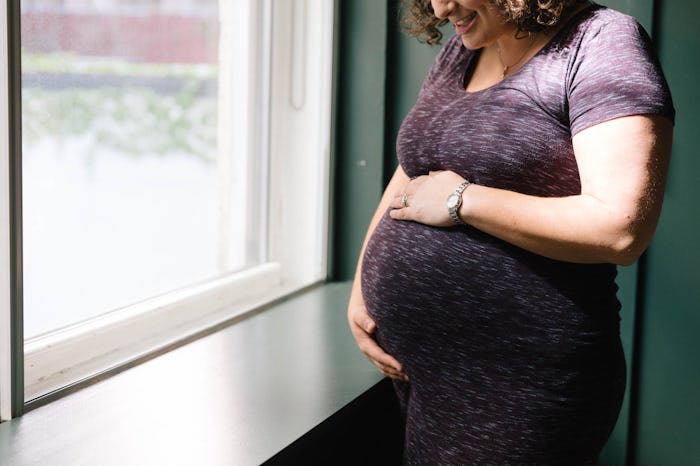Life
When Should You Go To The Hospital If You Think You're In Labor? An Expert Explains
Do you know what's super fun? Driving along one of the busiest roads in Manhattan as contractions bear down on you with the force of a rampaging bull. OK, maybe not fun, but it's inevitable, and the fear of a lot of pregnant women. But when should you go to the hospital if you think you're in labor? Is it better to get there early or just in time?
Let's face it, no one really wants to travel when it feels like their uterus is waging war on their body, but unless you're planning on a home birth, you'll need to do just that. Even if you're within walking distance from your hospital of choice, as many of my friends are in New York City, you still have to get from point A to point B without dropping it like its hot in the middle of the sidewalk.
When I was pregnant with my son, my OB-GYN told me to call her when my contractions were five minutes apart and lasting 60 seconds so that she'd know we were leaving and she could call ahead and have the hospital ready for me. However, I live in Brooklyn and the hospital is in Upper Manhattan. By the time I made it there, my contractions were coming every two minutes. It was awful. To be fair, none of us could've predicted the horrific traffic on a Sunday morning, when traffic is usually light. For my next labor, we amended that plan to include traffic.
I spoke with Jennifer Snyder, CNM from Upstate, New York, and asked her when exactly a mom should head to the hospital when she's in labor. Snyder tells Romper, "It really depends on the woman, the pregnancy, and where you live. I live way out in the sticks, closer to the border of Canada than any major city in New York. My patients are farmers and teachers coming from miles around, and sometimes in really terrible weather." (The amount of snow that falls upstate in the winter is daunting. They measure it in feet — not inches.)
But it's all about communication, according to Snyder. "When you get to your third trimester, you and your provider need to work out a plan for when you call them and when you go in," she says. "It will be different from the first to second baby. The first baby, they'll likely make you labor at home for a longer period of time. The second baby generally comes faster, so we bring you in faster." She says that women giving birth after having done it before are really good at recognizing the signs of childbirth, and tend not to panic as much.
"Sure, if you live a few miles away, the old standby of minute long contractions coming every five minutes makes sense, but if it's snowing sideways and you live 25 miles away, plans need to be in place," Snyder adds. "Or, if you have group B strep, you'll have to arrive earlier to get the antibiotics necessary. And if there is any sign of distress, or even if you're just very anxious, it's better to go in and be seen than stay at home and risk it."
Snyder also says that if you think you're in labor at any time before 37 weeks, or if your water breaks, call your OB-GYN or midwife immediately because you'll need to go in. If you're bleeding heavily or notice or feel something in your vagina, call 911, as it could represent a dangerous emergency. Labor is as unique as the woman giving it, and individual plans are paramount. Don't panic like I did — it really doesn't help matters. Although, screaming at my husband from downtown all the way uptown seemed to help, so you can definitely try that.
